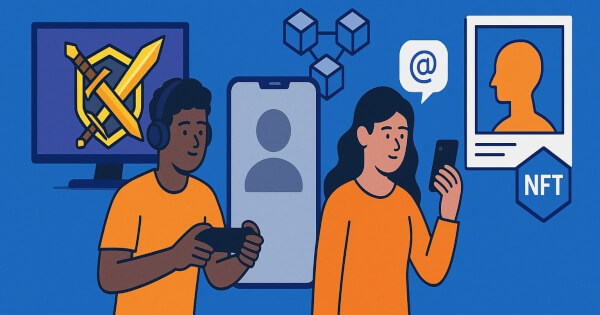Web3 Beyond Crypto: How Blockchain Is Entering Gaming, Social Media, and More
Khushi V Rangdhol Aug 18, 2025 23:37
Web3 in 2025 transforms gaming, social media, and digital art beyond crypto, enabling true ownership and decentralized identities, with major industry backing.

Keyword Takeaways
-
Web3 in 2025 is not just about cryptocurrencies—blockchain is transforming gaming, social media, digital art, and creator economies in ways never seen before.
-
Games powered by Web3 allow true digital ownership, cross-game assets, and fair monetization models, while social networks and browsers are adopting decentralized identity and privacy features.
-
Leading mainstream and gaming companies are onboard, with real-world impacts in emerging markets and big investments from industry giants.
Gaming: From Play-to-Earn to Play-to-Own
The gaming sector is at the forefront of blockchain’s evolution into mass-market applications. In 2025, top Web3 games like Axie Infinity, Derby Stars, and Banger Games offer players the ability to truly own digital items as NFTs, trade or use them across multiple platforms, and even earn income by participating in game economies.
Unlike traditional games where assets remain locked and purely cosmetic, Web3 gaming enables "cross-platform" utility—an NFT sword or avatar can travel between games and metaverses. Thanks to new standards such as Token-Bound Accounts (ERC-6551), these assets retain unlocks, achievements, and even histories that span multiple worlds.
Interoperability protocols and advanced scaling solutions (like Polygon and Immutable X) mean Web3 games now offer fast, nearly free transactions, removing friction for mainstream adoption and allowing industry partnerships with giants like Ubisoft, Square Enix, and Epic Games.
Social Media, Browsers, and New Creator Economies
Web3 is reshaping more than just interactive entertainment. Decentralized social platforms are giving users control of their data and identities—no more trusting monolithic companies with personal information. Blockchains support:
-
Decentralized identity solutions: Users log in to new services (browsers, games, social networks) via decentralized wallets instead of centralized usernames or social accounts, building portable reputations and persistent avatars.
-
Rewarding attention and creation: Browsers like Brave pay users Basic Attention Tokens (BAT) for viewing ads by choice, flipping the old model where platforms reap all ad revenue.
NFT marketplaces such as OpenSea and Rarible make it easy for artists and creators to monetize digital art, music, writing, and video. DAOs (decentralized autonomous organizations) run community-run economies where content creators and fans vote on platform development, sharing in both governance and revenue.
Real-World Impact and Investment
This movement isn't just hype—Web3 applications have attracted over 50 million active wallets, with a strong focus on emerging markets where digital ownership makes a real economic difference. In Southeast Asia, for example, play-to-own games are empowering entire communities, and global gaming majors are making strategic bets:
-
Epic Games Store onboarded 80+ Web3 titles in 2024–25, bringing blockchain games to traditional gamer audiences.
-
Ubisoft and Square Enix are shifting key development budgets to new NFT and blockchain-enabled franchises.
Driven by rapid technical progress—account abstraction, zero-knowledge proofs, and cross-chain protocols—these experiences now rival traditional Web2 apps for speed, cost, and user-friendliness, paving the way for the next generation of the digital world.
What’s Next?
As real and digital economies merge, expect even greater convergence of gaming, social, and creative platforms. Web3 will increasingly underpin digital identity, reputation, ownership, and value distribution—building a new internet where users and creators are in control, and “crypto” is only one layer of a much broader revolution.
Sources:
Alchemy Dapp Store, Metana, RapidInnovation, Safeheron, 101 Blockchains, RiseIn, Polkadot, Yellow.com.
Image source: Shutterstock

.jpg)